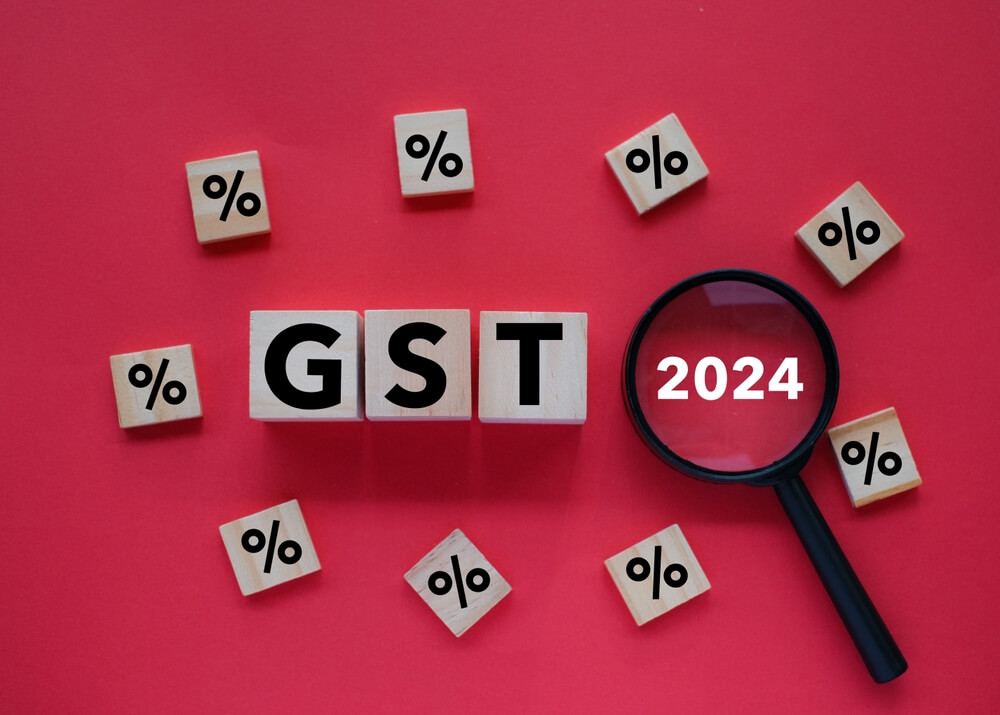Interim Union Budget 2024: Goods and Services Tax (GST)

Interim Union Budget 2024: Goods and Services Tax
With elections approaching, Finance Minister Nirmala Sitharaman presents an Interim budget for 2024, addressing the various schemes, programs, and economic development. This article gives information on GST and its proposed changes outlined in the Budget 2024 and Finance Bill.
IndiaFilings simplifies GST registration with expert support!!
Register Now!Budget 2024 Highlights
- The Finance Minister proposes maintaining the existing tax rates for indirect taxes and import duties.
- GST unified the previously fragmented indirect tax structure in India.
- This year, the average monthly gross GST collection has doubled, reaching Rs 1.66 lakh crore.
- The GST tax base increased two-fold.
- In the post-GST period (2017-18 to 2022-23), State SGST revenue buoyancy rose to 1.22 from 0.72 in the pre-GST period (2012-13 to 2015-16).
- 94% of industry leaders positively affirm the transition to GST.
- GST has facilitated supply chain optimization.
- The implementation of GST reduced the compliance burden on trade and industry.
- The decrease in logistics costs and taxes contributes lower prices for goods and services, benefiting consumers.
- Section 2 is amended to define an Input Service Distributor, and the distribution of tax credits must comply with Section 20.
- Section 20 is substituted to outline the distribution of tax credits by the Input Service Distributor (ISD).
- Section 122A is added, imposing a ₹1 lakh penalty per unregistered manufacturing machine and allowing for seizure unless the penalty is paid.
Budget 2024: GST Rates
The finance minister stated that rates of indirect taxes and import duties remain the same. It applies to GST rates as well. Below, we have given the existing GST rates for various goods and services Catego
| GST Rate | Description | Examples |
|---|---|---|
| 0% (Nil Rated) | Goods and services exempted from GST | Fresh fruits and vegetables, non-AC hotel accommodation (up to ₹1000 per day per unit), exports |
| 0.25% | Textiles | Fabrics, yarns |
| 3% | Gold | Gold jewellery, bars, coins |
| 5% | Essential items and services | Processed and packaged food items, milk, curd, newspapers, books, hotel accommodation (₹1000-₹2500 per day per unit), transportation services |
| 12% | Most processed goods and services | Clothing, footwear, soaps, detergents, restaurants (excluding AC restaurants), movie tickets (up to ₹100), business class air travel |
| 18% | Most general goods and services | Electronics, appliances, furniture, household items, AC restaurants, movie tickets (above ₹100), economy class air travel |
| 28% | Luxury goods and services | Luxury cars, betting and gambling, pan masala, aerated drinks |
Find the latest GST rates for all Goods and Services
Amendment of Section 2: Definition of ‘Input Service Distributor’
In Section 2 of the Central Goods and Services Tax Act, clause (61) is substituted with the definition of Input Service Distributor. It is defined as an office of a supplier of goods or services or both receiving tax invoices towards the receipt of input services on behalf of distinct persons referred to in section 25. A ‘distinct person’ refers to an individual or entity treated separately for GST registration and compliance purposes, though it belongs to the same organisation or group. Remember, the tax invoices include the services liable to tax under sub-section (3) or sub-section (4) of section 9. Also, the ISD is liable to distribute the input tax credit in the manner mentioned in section 20.
Substitution of Section 20: Manner of Distribution of Credit by Input Service Distributor (ISD)
An Input Service Distributor (ISD) must distribute the central tax or integrated tax credit from received invoices. This includes credit paid by a ‘distinct person’ in the same state for services taxed under specific sections. The ISD must follow prescribed rules regarding the distribution method, timing, restrictions, and conditions. Additionally, the credit for central tax must be distributed as either central tax or integrated tax, and the credit for integrated tax must be distributed as either integrated tax or central tax. An official document specifying the amount of distributed credit must be issued according to prescribed regulations.
Insertion of Section 122A
Section 122A has been added to the Central Goods and Services Tax Act. This section specifically deals with penalties for non-compliance with special registration procedures notified for machines used in manufacturing. If someone fails to register a machine under such a procedure, they face two potential consequences:
- A penalty of ₹1 lakh per unregistered machine, in addition to any other penalties under the GST Act.
- Seizure and confiscation of the unregistered machine. However, the machine can be saved from confiscation if:
-
- The imposed penalty is paid, and
- The machine is registered within three days of receiving the penalty order.
This new section emphasises the importance of complying with special registration procedures for specific machinery in manufacturing activities. Failure to do so can lead to significant financial penalties and potential loss of equipment.
Also read: Step by Step Guide to GST Registration for Businesses
Below, we attached an excerpt of the Budget 2024 regarding GST, presented by Finance Minister Nirmala Sitharaman.
Budget 2024 Goods and Services Part B ExcerptConclusion
In conclusion, the Interim Budget 2024 reaffirms the positive contributions of GST to India’s economic landscape. With a unified tax regime, compliance, and benefits for businesses and consumers, the reformed system continues to prove its value. While major changes are absent in this interim budget, the upcoming full budget, which will be announced, might offer further developments or clarifications related to GST. Regardless, staying informed about potential reforms and industry trends is crucial for businesses and individuals to adapt and optimize their strategies in the evolving GST environment.
Ensure GST compliance with our professional registration service!!
Register Now!

